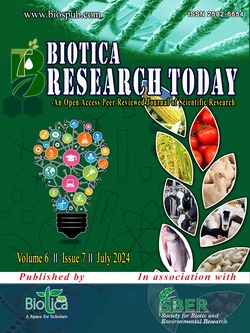
Leveraging Biosensor Technology for Sustainable Vegetable Farming Practices
Jasdeep Kaur
Dept. of Vegetable Science and Floriculture, CSK Himachal Pradesh Krishi Vishwavidyalaya, Palampur, Himachal Pradesh (176 062), India
Nikhil Thakur*
Dept. of Vegetable Science, Dr. Yashwant Singh Parmar University of Horticulture and Forestry, Solan, Himachal Pradesh (173 230), India
Shveta Thakur
Dept. of Entomology, Punjab Agricultural University, Ludhiana, Punjab (141 004), India
Rishabh Kumar
Dept. of Vegetable Science, Dr. Yashwant Singh Parmar University of Horticulture and Forestry, Solan, Himachal Pradesh (173 230), India
DOI: NIL
Keywords: Biological, Biosensor, Pest management, Vegetable
Abstract
Biosensor technology is revolutionizing vegetable farming by facilitating more sustainable approaches. These sophisticated tools merge biological components with physicochemical sensors to deliver accurate, real-time monitoring of key agricultural aspects like soil nutrient levels, pesticide residues and pathogen presence. Through the utilization of biosensors, farmers can make well-informed choices regarding irrigation, fertilization and pest management, thereby improving crop health and yield while reducing resource usage and environmental impact. This piece delves into the various uses of biosensors in vegetable cultivation, underscoring their significance in ensuring food safety and enhancing traceability. Despite obstacles such as integration and data handling, continuous progress is tackling these challenges, paving the way for wider acceptance. With the agricultural industry seeking more effective and sustainable practices, biosensors present a hopeful solution, transforming vegetable farming techniques and contributing to the global drive for sustainable agriculture.
Downloads
not found
Reference
Ghasemi-Varnamkhasti, M., Rodriguez-Mendez, M.L., Mohtasebi, S.S., Apetrei, C., Lozano, J., Ahmadi, H., Razavi, A.H., de Saja, J.A., 2012. Monitoring the aging of beers using a bioelectronic tongue. Food Control 25(1), 216-224. DOI: https://doi.org/10.1016/j.foodcont.2011.10.020.
Giuliano, K.A., Taylor, D.L., 1998. Fluorescent-protein biosensors: New tools for drug discovery. Trends in Biotechnology 16(3), 135-140. DOI: https://doi.org/10.1016/S0167-7799(97)01166-9.
Mehrotra, P., 2016. Biosensors and their applications - A review. Journal of Oral Biology and Craniofacial Research 6(2), 153-159. DOI: https://doi.org/10.1016/j.jobcr.2015.12.002.
Thakur, N., Kaur, J., Rishab., Aakriti., 2023. Revolutionizing vegetable crops: Unleashing the power of gene pyramiding. Biotica Research Today 5(7), 504-506.
Wu, B., Piatkevich, K.D., Lionnet, T., Singer, R.H., Verkhusha, V.V., 2011. Modern fluorescent proteins and imaging technologies to study gene expression, nuclear localization and dynamics. Current Opinion in Cell Biology 23(3), 310-317. DOI: https://doi.org/10.1016/j.ceb.2010.12.004.
